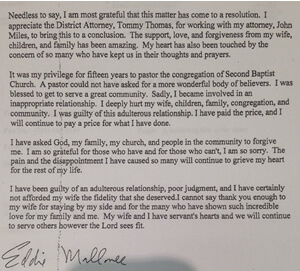What Is Marital Misconduct in Tennessee Divorce Law?
- At December 23, 2013
- By Miles Mason
- In Divorce
 2
2
Probably one of the most loaded questions for any Tennessee divorce lawyer is “what marital misconduct constitutes grounds for divorce?” The answer lies in Tennessee’s marital dissolution law and, for some, it isn’t pretty. T.C.A. § 36-4-103.
What is Considered Marital Misconduct?
Marital Misconduct Goes Beyond Foolish Indiscretion
Marital misconduct is more than mere foolishness or indiscretion. The spouse’s behavior is considered to be so wrongful as to erode the marriage, destroying the bonds between a man and woman.
Call it wicked or wild fun, call it immoral or an open marriage, call marital misconduct whatever you will. The fact remains that under Tennessee divorce law, certain acts (or inactions) are grounds for the court to grant a spouse’s request to dissolve the marriage and, quite possibly, punish for bad behavior in the process through an award of alimony.
Marital Misconduct Examples
15 Statutory Grounds for Divorce in Tennessee
There are 15 grounds for Tennessee divorce, although not all of them relate to bad acts, failures, or mistakes:
- Adultery
- Pre-marital pregnancy
- Attempting to kill one’s spouse
- Abandonment
- Desertion
- Refusal to move to Tennessee
- Habitual drunkenness or drug abuse
- Conviction of an infamous crime
- Conviction of a felony crime
- Indignities
- Cruel and inhuman treatment or inappropriate marital conduct
- Bigamy
- Impotence and incapacity to procreate
- Two-year separation
- Irreconcilable differences
Take a closer look at the statutory grounds for marital dissolution, starting with adultery.
1. Adultery: Scandalous Grounds for TN Divorce
A spouse commits adultery by willingly having sex with someone outside the marriage. While some spouses may live apart and maintain separate households, cohabitating with a significant other while married is still adultery.
There is nothing new about adulterous relationships and the drama it brings to the lives of intimate partners. Nathanial Hawthorne’s 1850 romance novel “The Scarlet Letter” places the protagonist Hester Prynne in 1642 puritan Massachusetts. With her husband missing and presumed dead (he’s not), young Hester finds love in the arms of another man (her minister), gets pregnant, is ostracized and marked with the “A” of an adulteress. (Actress Demi Moore portrayed the lovely Hester in the 1995 film loosely based on the historical novel.)
Adulterous relationships can have serious consequences, one of which is divorce.
2. Secret Pregnancy
Maybe you have heard this story before, too. She’s pregnant when they marry, husband’s not the father, and he didn’t know she was pregnant. That scenario provides the husband with grounds for divorce. She engaged in sexual intercourse while unmarried, which is fornication. (If the biological father was married at the time of the exchange, he would be an adulterer.)
There is an interesting twist to the secret pregnancy grounds, though. If the husband was having sexual relations with her before the marriage, too, then he cannot use this charge to divorce her now. The reason being he obviously knew of his wife’s unchastely ways before they married. A little like calling the kettle black, so to speak.
3. Malicious Attempt at Killing One’s Spouse
There does not need to be an attempted murder conviction for a wife to divorce the husband who attempted to kill her off, or vice versa. Accidents do not count. The attempt to snuff the life out of one’s better half must be intentional, deliberate, and just plain malicious. What if the plan succeeds? Divorce is not possible because the death terminated the marriage first.
Although it may be sufficient grounds, no one can be forced to divorce their aberrant spouse when both choose to stay united. For some, remaining married after the poison plot is exposed could provide a more meaningful form of punishment.
Consider the case of ex-pastor Eddie Mallonee of Union City, Tenn. In December 2013, Mallonee accepted a plea deal to felony reckless endangerment after conspiring with his girlfriend to poison his wife. (The girlfriend, Shelly Moran, also pleaded guilty.) Throughout the criminal proceedings against her husband, the pastor’s wife of 34 years stood by her man, for better or for worse. This was definitely ‘for worse’ though. Should the ex-pastor’s wife desire release from the marriage, she probably has legitimate grounds for divorce.
4. Abandoning Without Cause or Spousal Support
Most people think abandonment only occurs when one spouse deliberately walks away from the marital home without good reason, with no intention of returning anytime soon. In that case, the party left holding down the marital fort is the abandoned spouse. But abandonment also occurs when one party unjustifiably throws the other spouse out of the home, figuratively or literally.
In both types of abandonment, a key consideration for the court is whether spousal support for the abandoned party was provided when sufficient resources were available to do so.
Sometimes abandonment goes hand-in-hand with adultery, as when a spouse leaves the marital home to take up residence with a significant other.
5. One Year of Malicious Desertion
To pin desertion on the party who left the marital home, the absence must continue for a full year and leave the other spouse without means of support. Furthermore, the act of walking out on the marriage must be malicious and deliberate, without good reason. (An example of good cause for leaving might be the deserted spouse’s habitual drunkenness.) Similar to abandonment, if the absentee provides support for the remaining spouse, then it is not a case of desertion.
6. Spouse’s Refusal to Move to Tennessee
Refusal to move to Tennessee is perhaps one of the more unusual grounds for divorce, but it falls within the same category as abandonment and desertion.
If one spouse resides here and the other spouse resides in a different jurisdiction, such as California, that in itself is probably an indicator of marital problems. But when the out-of-state party willfully refuses to join her spouse in Memphis without sufficient reason for staying away (he is physically abusive, for instance), the Memphis spouse needs only calendar 24 months before filing for divorce. When willful refusal to remove to Tennessee continues for two years, the court may grant a divorce even if the parties have minor children.
7. Habitual Drunkenness or Abuse of Narcotics
So many families are broken by addictions. If a spouse’s drug or alcohol abuse began after the marriage, or was unknown to the other party until after they were married, then a divorce may be granted.
8. Conviction of an Infamous Crime
Every criminal act is serious. But some crimes draw the ire of civilized Tennesseans more than others, mainly because of the mens rea, or mental element, associated with the criminal act or the violence of the criminal act itself, the actus reus.
These “infamous” crimes are found throughout Tennessee law and include incest, rape, forgery, larceny, horse theft, and breaking into an outhouse (think about it).
9. Conviction of a Felony Crime
One spouse’s felony conviction followed by a prison sentence in any jurisdiction is sufficient grounds for divorce in Tennessee.
10. Inflicting Indignities on a Spouse
Suffering indignities refers to a victimized party, one who is the target of the other spouse’s abuse or alienation. For example, a woman leaves her husband for reasons of physical and mental cruelty. She files for divorce because his pattern of humiliation created an intolerable, overly burdensome situation for her. An existence that left her no real option but to leave the marital home.
In Tennessee, conduct considered to be an indignity against the person is interpreted very broadly. The acts are such that, over time, they undermine the victimized spouse’s sense of self and value as a human being. Persistent neglect, alienation, abusive and insulting language, settled hatred, estrangement, spousal abuse, attempting to inflict physical pain, and any combination thereof may support the indignities ground for divorce.
11. Cruel, Inhuman, or Inappropriate Marital Conduct
Alleging grounds of inappropriate marital conduct can be a catch-all for any activity that undermined the parties’ marriage. Certainly, domestic violence is cruel and inhuman, capable of creating a very dangerous living situation for the victim. But inappropriate conduct does not always involve some form of physical abuse. It need only be willful and persistent, such that the behavior causes a spouse to suffer needlessly. To read more about this widely used reason for divorce, take a look at What is Considered Inappropriate Marital Conduct?
12. Why Bigamous Marriages Never Work
The second marriage is never legal because Tennessee does not recognize polygamy. The divorce issue does not focus on the latter bigamous marriage, but on whether the injured spouse from the only valid marriage wants out. Say, for example, because her husband “married” another woman. Indeed, hell hath no fury…
13. Impotence Plus Incapacity to Procreate
Consider the spouse whose incurable impotence existed before the marriage took place. If that person is also unable to have sexual relations with the other spouse, along with the inability to procreate, then a divorce may be granted.
14. When Walking Away from the Marriage Is Best
For spouses who have no minor children, one possible ground for divorce is to remain separated for a full two years. That separation has to be a physical one. No sharing the same residence and no sexual relations between the spouses for the entire two-year period.
15. No Marital Misconduct, Yet Still Need a Divorce? Irreconcilable Differences
Not every divorce involves marital misconduct, of course. Some couples are so polarized and committed to their respective positions – emotionally, intellectually, psychologically, spiritually – that the only thing they seem to agree on is that they cannot continue living together. Their differences are irreconcilable and that is grounds for divorce.
Tennessee divorce law gives these spouses a path out of their marriage without the necessity of embarrassing testimony, nasty accusations, and hurtful disclosures.
What happens when a party objects to this type of divorce? Asking to end a marriage on grounds of irreconcilable differences is essentially an uncontested divorce – the parties must be in agreement. If either spouse objects, then the court cannot dissolve the marriage. As a consequence, the unhappy spouse will have to establish the existence of some other grounds in the now contested divorce case.
Once the Divorce Is Filed, Chill
To give the parties time to chill and get a grip on their emotions (or perhaps even reconcile), among other things, Tennessee has two very specific waiting periods. Before any hearing on the divorce can proceed, be prepared to wait either 60 days or 90 days:
● 60 days for couples without minor children (or whose minor child is already married and emancipated). The divorce complaint must ripen for two months before the case will be heard in court.
● 90 days for spouses with minor children. The divorce complaint must ripen for three months before the case can be heard.
Whenever a divorce involves minor children, proceedings can become quite passionate for both parents. A little more time to cool off and consider what is truly in the best interests of the children can lead to better parental decisions overall with a better outcome for everyone.












